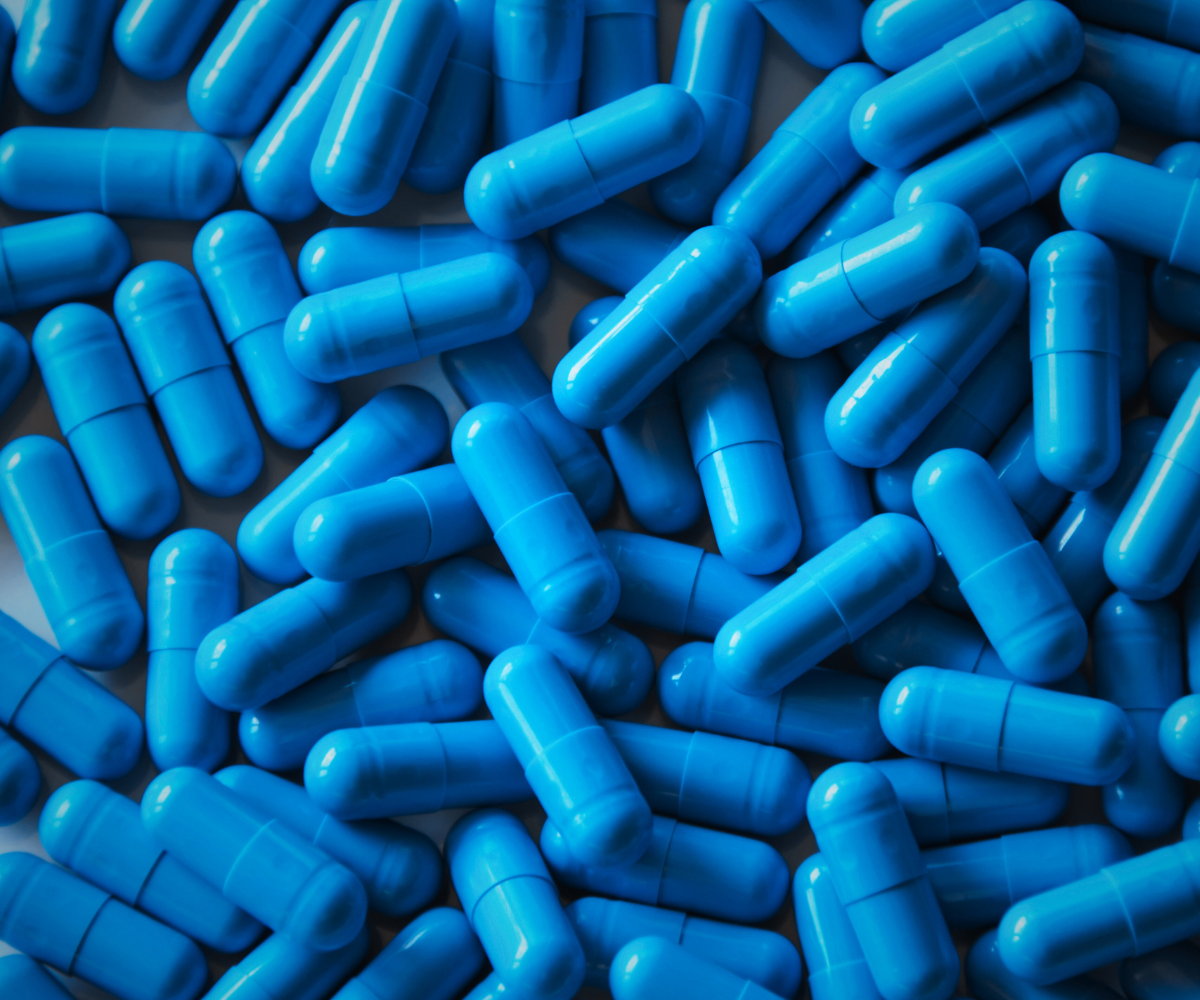
The Benefits of Methylene Blue

Methylene Blue is rising in popularity as a wellness supplement.
It was initially created in the 19th century as a dye. More recently, scientific evidence supports the use of Methylene Blue for many health goals.
These include treating conditions like methemoglobinemia, improving memory and brain function, and acting as an antioxidant.
Read on to learn about Methylene Blue benefits, side effects, and more.
What Is Methylene Blue?
Methylene Blue is a synthetic chloride salt, also called Methylthioninium chloride or Swiss Blue.
Historically, Methylene Blue was first used as a textile dye because of its vivid blue color. Quickly, scientists discovered broader uses for this substance.
Methylene Blue became a medical stain to help highlight specific components of tissues and cells under a microscope.
From there, Methylene Blue was used to treat bacterial and parasitic infections because of its antimicrobial properties.
Then Methylene Blue became the first fully synthetic medication approved for use in therapeutic treatments. It was approved by the FDA to treat malaria, and later methemoglobinemia (elevated methemoglobin levels in the blood).
Methylene Blue Benefits
Aside from established medical uses, Methylene Blue is emerging as a wellness and anti-aging therapy. There are several promising potential benefits of Methylene Blue.
Anti-Aging Benefits
Mitochondria are known as the powerhouse of the cell. They help cells generate energy in the form of adenosine triphosphate (ATP).
As we age, our mitochondria begin to deteriorate and function less effectively. This causes reduced energy production and premature cell death, which interrupt many bodily processes.
This process can lead to the hallmark signs of aging, which include:
- Muscle weakness and less tolerance for exercise
- Loss of vision and hearing
- Slowed cognition and poor memory
- Fatigue and difficulty sleeping
Methylene Blue can encourage a process called mitochondrial respiration, which allows the mitochondria to generate energy as ATP.
Methylene Blue also acts as an antioxidant that reduces oxidative stress (damage to the cells from free radicals). Oxidative stress is a leading cause of mitochondria dysfunction.
In this way, Methylene Blue may have potent anti-aging benefits.
Memory and Cognitive Ability
As we age, our cognitive abilities and memory often decline. While the exact cause is still unknown, research points to mitochondrial dysfunction.
As mentioned above, Methylene Blue may reduce mitochondrial dysfunction by helping the mitochondria produce energy and protecting against free radicals.
Crucially, Methylene Blue can also cross the blood-brain barrier (BBB). The BBB is a protective layer of cells around the brain that stop potentially harmful substances from crossing through into the delicate tissues of the brain.
Unfortunately, the BBB can also stop beneficial substances like medications from reaching the brain.
Methylene Blue crosses this barrier, which is how it may assist with neurological issues like loss of memory and cognitive decline.
Once in the brain, Methylene Blue acts as an antioxidant that fights against free radicals. It may also protect against the degeneration of brain cells.
While more studies are needed to identify Methylene Blue’s precise effects, studies show it may be beneficial for the treatment of:
- Age-related loss of memory and decreased cognition
- Optic Neuropathy (damage to the optic nerve that leads to vision issues)
- Parkinson’s Disease
- Alzheimer’s Disease
- Dementia
Depression and Mood
Methylene Blue has shown potential antidepressant effects, as well.
In several studies dating back to the 80s, participants who took Methylene Blue experienced statistically significant improvements in their depression and mood. In one study, bipolar manic-depressive participants took the medication alongside Lithium and saw positive impacts on their depression.
In a more recent 2017 study, participants who received 195mg of Methylene Blue alongside Lamotrigine saw significantly improved symptoms of depression. By comparison, the control group that only received a 15mg placebo dose of Methylene Blue did not see the same improvements.
In addition, an overview of literature in 2022 showed that Methylene Blue had antidepressant-like qualities, as well as other benefits.
While more studies are needed to classify Methylene Blue as a treatment for depression and mood disorders, it appears to help when taken alongside other mental health medications.
In theory, Methylene Blue may cause these positive effects by increasing serotonin and dopamine levels. It does this through inhibiting monoamine oxidase A, which is an enzyme that breaks down serotonin.
Treatment for Methemoglobinemia
Methemoglobinemia (MetHb) is a rare condition where there is too much methemoglobin in the blood. This leads to low oxygen levels in cells and tissues.
MetHb is often called “blue baby syndrome” because the condition can turn skin, nail beds, lips, and the tongue blue.
In addition to changes in color, symptoms of MetHb include:
- Fatigue and drowsiness
- Muscle weakness
- Headaches
- Pale skin
- Seizures
- Rapid breathing and heart palpitations
The causes of MetHb are varied.
Acquired MetHb can be caused by medications like benzocaine, lidocaine, dapson, or nitrates in certain medications. It can also be caused by illicit drug use of myl nitrite or nitrous oxide (poppers and laughing gas, respectively).
On the other hand, genetic MetHb is inherited and present from birth.
Methylene Blue is an effective and generally safe treatment for MetHb.
Methylene Blue reduces the amount of methemoglobin in the blood, bringing it back into balance with hemoglobin (the proteins that carry oxygen).
The medication accomplishes this because it converts into nicotinamide adenine dinucleotide phosphate (NADPH) in the body. NADPH then acts on methemoglobin, reducing the amount circulating in the blood.
Methylene Blue Side Effects
While Methylene blue has a generally good safety profile, there are potential side effects.
Common side effects include:
- Dizziness
- Headache
- Increase in sweating
- Upset stomach (potentially including nausea, vomiting, and diarrhea)
- Frequent urination
- Stomach cramps
- Discolored stool and urine
- Slightly bluish or greenish skin
These side effects will typically ease over time and don’t require medical attention.
Though rare, there are more serious side effects that may require patients to see a doctor. These include:
- Allergic reaction
- Chest pain
- Increase in blood pressure
- Hemolytic anemia in patients who have a preexisting condition called G6PD Deficiency
- Serotonin syndrome
To avoid more serious side effects, it’s important to know if you have any contraindications (reasons to not take Methylene Blue). These include:
- Existing hypersensitivity to Methylene Blue or thiazine dye
- Glucose-6-phosphate dehydrogenase (G6PD) deficiency
- Severe kidney disease
- Severe liver disease
- Pregnancy and breastfeeding
- Taking medications that increase Serotonin production or make Serotonin more available to use in the body. (This is not always a contraindication depending on dose, so speak to your provider to see if Methylene Blue is appropriate for you).
Methylene Blue Dose and Forms
Methylene Blue is typically administered intravenously or via oral capsule.
Intravenous Methylene Blue is normally reserved for treatment of methemoglobinemia. It’s administered at a higher dose when used for this purpose.
For potential anti-aging, cognition, and mood effects, Methylene Blue is administered as a capsule. There are various doses available through Defy Medical:
- 5mg
- 10mg
- 15mg
- 25mg
Patient typically start with a lower dose and increase over time if necessary.
A common starting protocol is two 25mg capsules per day for a daily dose totaling 50mg.
This is an example, and you should always follow the dosage instructions from your medical provider.

Methylene Blue at Defy Medical
Methylene Blue is an emerging therapy with many potential benefits. It may help with cognition, memory, anti-aging, depression, and other conditions.
When taking any supplement, it’s important to order from a qualified pharmacy to avoid low-quality and potentially dangerous supplements.
Through Defy Medical’s trusted pharmacy network, we offer access to high-quality, pharmaceutical-grade Methylene Blue for qualifying patients.
Ready to learn more?
Get Started

